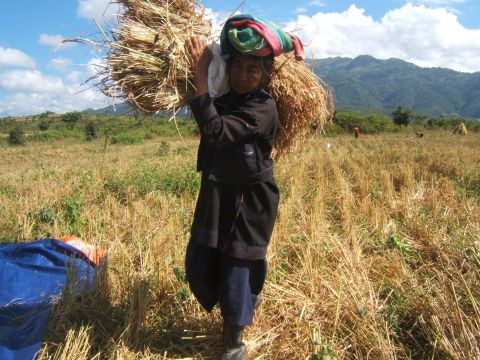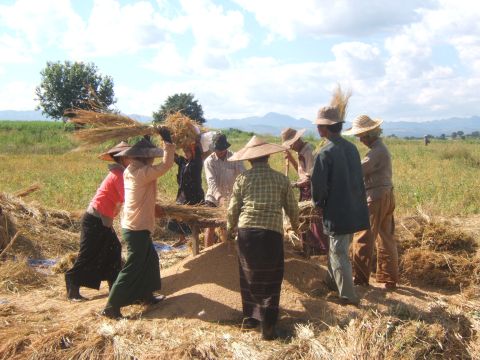Neglected Inheritance (or) Pa Oh Ethnic Traditional Rice Variety
Pa Oh ethnic group is a ethnic minority in our Country, Myanmar. But the Pa Oh are the third biggest ethnicity of Shan State (9.49 %), most live in the Southern Shan State Region. Most of Pa Oh people are living in Upland Area and mountain region by practicing farming activities. Since their ancestors, they have used one kind of upland rice variety; (Byu Maemine) for their family food security. Byu Maemine is a local upland rice variety with a very special meaningful for them. It means that a widow may overcome her debt by growing this local variety. (As Pa Oh Language, Byu=Rice, Maemine=Widow)
Byu Maemine Upland Rice is very suitable variety for upland region, mountain region and also resistant to local pests under upland weathers. Mostly they usually start to grow this variety in the early season of Monsoon and they harvest at the end of Monsoon season. As Byu Maemine variety is not High Yield Variety, they don’t need to use any chemical fertilizers to get the average production about 40 Baskets per Acre. By working together and collective actions in every steps of traditional rice production system, it has benefited the social values and ecological values for their societies. The local Byu Maemine also has a higher milling percentage (about 50-60%) than other lowland and paddy rice, and also a very attractive Red-Brown Color with high content of nutrition. For me, I started to work with Pa Oh Ethnic in 2011 and this local upland rice, Byu Maemine is one of my favorite rice and most delicious one I ever experienced. So I believe that the wise ancestors of Pa Oh Ethnic people used to this Upland Rice Variety and generated for their next generations.
Nowadays, all of the Pa Oh upland area is covering with Hybrid-Corn Mono-Cultivation (Single Crop Growing) under Money-Oriented Agricultural System. They have abandoned most of the upland rice varieties including Byu Maemine Variety under influence of Hybrid-Corn Production. Pa Oh people are more focusing on their economics instead of their social and ecological conservations and they are depending on the market for their foods including rice. Now most of the young generations of Pa Oh Ethnic are forgetting the valuable inheritance of their grandparents.
Byu Maemine derived from Byu=Rice and Maemine=Widow in the Pa Oh Language
All things are based on my experiences of upland rice farmer field school project in Southern Shan State.
Myanmar (Burma)

